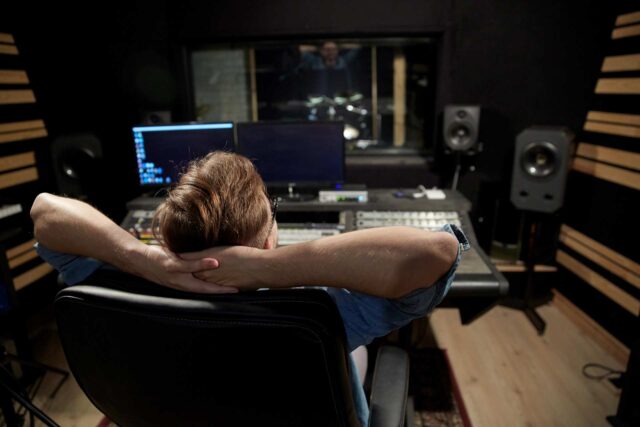
You knew it the day you put your headphones on for the first time. A pull to the rhythm you couldn’t quite explain and with every progressive sound and track, you wanted to make some of the magic that you heard on the radio and the air pod. Some days you just hummed the magic but now you are setting out to create your own space in the world of music.
It is undeniable the beauty and force that music has over our lives. To become a music producer is to share in this gift from the god Apollo himself. Ok, maybe a little bit of a stretch but staring at your timelines and seeing the tracks come together sure feels like something only the gods can create.
But then you reach that anti-climax downhill where 789 tracks and ripped papers later nothing seems to work. You go to the internet and visit site like Producer Confidential. Well, maybe you can borrow from the wisdom of those who have gone before you by learning some mistakes that first-time music producers make and how you can avoid them:

Pre-production Mistakes:
Typically, the production process is divided into three stages: pre-production, production, and post-production. The pre-production stage is where the preparation is made and resources are gathered to make that killer production. Some mistakes made at this stage include:
- Downplaying the importance of a good sound choice: every type of artist has to choose what tools and gadgets to use in their crafts and projects. A chef, his ingredients, a painter, his palette, and a filmmaker, his script. When setting out to produce, there are vast frequency spectrums to choose from. The ultimate choice will be made on the genre and mood or vibe you’re going for. To make your work easier, you can have a catalogue of tracks you love in a favorite folder to choose from.
- Throwing away the references: most producers buy into the idea that referencing makes one sound like other producers and robs them of authenticity. Nothing could be further from the truth. Referencing helps you to understand the industry standards of production and guides how you do your productions. It can also help you get the sound choice for arrangement ideas you want very easily.
- Starting production without a purpose: it might seem cool to just hop on to your device and make a beat but more often than not, that option just leaves you confused and going all about different genres and production styles. Having intentionality in your processing process will save you so much time while bringing clarity to your music. Plus your CPU doesn’t have to groan under the weight of your indecision and 17 open tabs that are trying to catch flying melodies.

Production Mistakes
So now we know what to avoid as you prepare yourself for production and you’ve actually begun the process of producing, mixing, and processing. Some hitches you might find on the way include:
- Finding yourself stuck in a loop, literally: so you’ve made this really cool loop but the elements are just too few to make a full track. Stuck in limbo on what sections to add to the arrangement, it can feel like a dead-end of having created only 45 seconds of music and three minutes of destitution. To help you get out of the rut, refer back to the genre you are working under to know what the sections tracks in that genre typically consist of. (See why referencing is so handy) you can just import your reference tracks and check out the arrangement. The reference track can help you out as you may need to just make slight variations of the initial loop elements and then spread them out across the arrangement.
- Be wary of varying BPM rates: stick to your default tempo and adjust accordingly as you go on. Remember that as you continuously produce, your ears adapt to the tempo quickly, and it starts sounding right. Check to see at the end of a track and change tempos to see whether fast or slow is the way to go. Taking a break from work and coming back also helps to bring new perspectives.
- Harmony: balancing between too little and too much is the key here. You wouldn’t want your music to be too simple and thus boring or too much and complex for the simple human ear. Harmony doesn’t have to be too much; just subtle and repetitive to keep listeners engaged.

Post-production Mistakes
Now that your track is ready you might get into the following mistakes at this stage:
- Hanging on to perfection: so you’re listening to your track and find a slightly aggressive low end that you can hear and so you begin readjusting and adjusting again. As you try to tune everything so that there are absolutely no rough edges, you might end up with a track that is too plain. Go easy on yourself and remember that sometimes, the magic and realness is the imperfection that you are trying so hard to get rid of.
- Conforming to the crowd too much: ideally, we are designed to learn through imitation. Taking a leaf or two from the books of those we admire is a great thing and a necessary step to greatness. However, if we let this be the yardstick to measure our productions, then there is a danger in conforming and producing just like everyone else or not producing at all because you are afraid your work is not good enough. Remember that when it comes to creative ventures, your greatness comes from your difference.

Client-relation Mistakes:
Working with clients can happen at any of the stages of production. Maybe it’s an artist who wants to make their music from scratch or one who just wants a beat. When it comes to dealing with clients, here are some mistakes you can make:
- Failure to understand the vision the artist has: every artist wants their music or productions to feel, look or sound a certain way. Your work as a producer is to seek to align yourself with the vision that the artist has to reduce frustration on both ends.
- Failing to be responsible and reliable: no one wants to work with a flake, don’t be one.
- Contract malfunctions: set the contract before you begin working with them. They might be your friends (especially if they are your friends) but do not fail to have this in place. Also, ask for upfront payments and don’t release music before full payment. The contract doesn’t have to be a complex document but just one containing the important parts of your agreement overseen by a lawyer.
- Burning bridges: maintaining relationships will help you get connected to other people and recommended for your next gigs.

Conclusion
The process of mastery is in the daily practice and the trust in self. It is important not to leave your education and growth to chance: get the right, structured resources for yourself. Not only does it save you time but it also saves you money and skyrockets your growth.
Whether you’re a beginner or a pro, there is something for everyone because the industry is changing and so should you.









